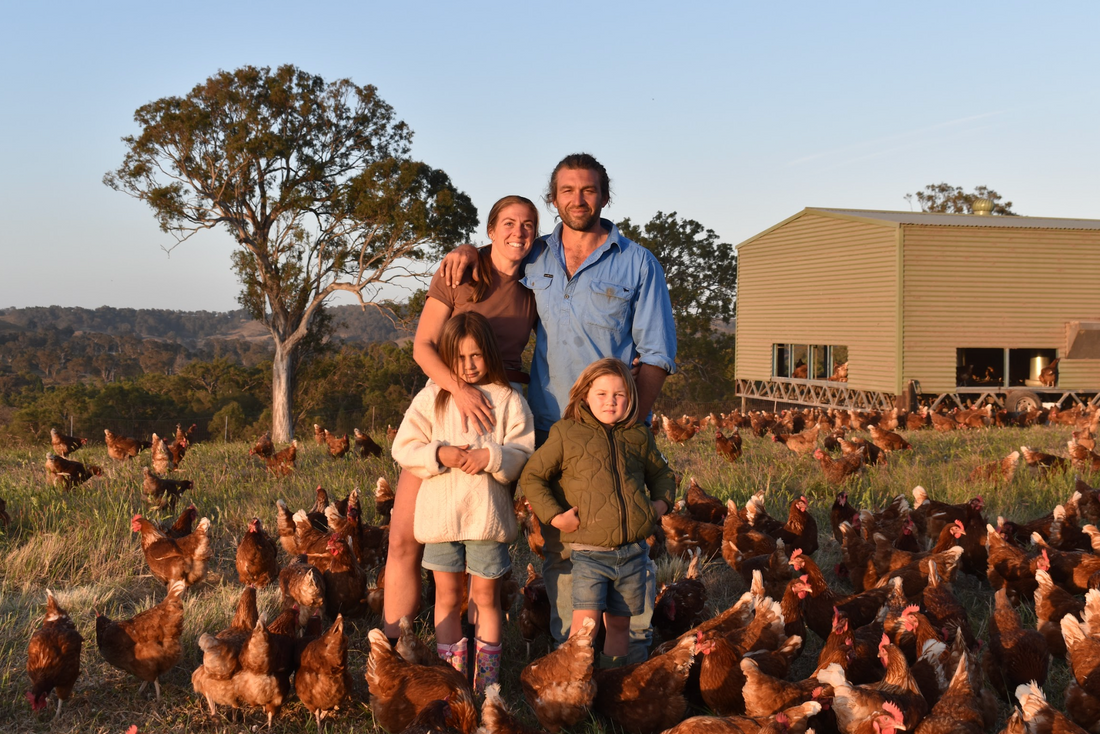
Joscelin - Joscelin McMillan
Share
Deep in the Bega Valley, Joscelin McMillan is raising her young family and running a thriving regenerative egg farm alongside her husband, Tom. What began as a volunteer role during pregnancy soon turned into a calling - one rooted in caring for the land, raising happy hens and producing deeply nourishing food.
Since taking over Bega Valley Eggs in 2019, Joscelin has become a passionate voice for sustainable farming, balancing the demands of business with motherhood while carving her place as a woman in agriculture.
Grounded in resilience, creativity and care, Joscelin’s story is one of connection - to the land, to her animals and to the community. In this interview, she shares what life looks like on the farm, her vision for the future and the strength rural women bring to shaping agriculture in Australia.

Hi Joscelin! For those who don’t know you, can you tell us a little about yourself, your family and where you call home?
I live in the Bega Valley with my husband Tom, our daughter, our son, and a baby due in September. Family and work overlap on our 300-acre farm, but it’s also where we find pockets of bushland to play, recharge, and connect with the land that grounds us.
How did you and Tom first come across Bega Valley Eggs - and what inspired you to take over the business in 2019?
I first volunteered at Bega Valley Eggs while pregnant with our second child and was struck by the potential of regenerative farming to restore soil and grow nourishing food. When the original owners moved on, they offered us the chance to take over, and we knew instantly it was our way into agriculture, and into one day living on our own farm.

Was agriculture always part of your life, or was it something you grew into?
Tom grew up on a dairy farm, and ever since it was sold when he was 17, he knew he wanted to return to farming and raise our kids on the land after we pursued other goals in our early 20’s. For me, it came later, born from a passion for nutrient-dense food and the joy of being immersed in the outdoors. Together, agriculture became the natural meeting point of both our dreams.
Can you walk us through a typical day on the farm - from sunrise to sunset?
Basically our mornings begin with checking the hens and dogs, making sure everyone is healthy and happy before we start collecting eggs, which is the biggest part of each day. Twice a week we fill waters and feed, and once a week the sheds are moved onto fresh pasture so the hens always have new ground to explore. The grading room hums four days a week, and we’re on the road with deliveries twice a week. Every part of the cycle from paddock to plate happens right here on the farm. That answer sounds so straight forward, but as you know on a farm, something else always comes up!

You describe yourselves as “custodians of the land.” What does that responsibility look like in practice?
It means farming in a way that leaves the land healthier and more productive than when we found it. One day our children, or someone else, will care for this place, and I want them to inherit land that is productive and still carries its beauty and abundance.
Why was regenerative farming the path you chose, and what does it mean for your hens, your land, and your customers?
Regenerative farming allows our hens to live fully as hens, scratching, foraging and roaming, while building healthier soils under their feet. For us, that means happier animals, vibrant pastures, and deeply nourishing eggs for the people who eat them.
What’s the biggest misconception people have about “free-range” eggs?
That “free range” means hens are always outdoors. In reality, many spend most of their lives in sheds with limited access, whereas our hens live outside in open paddocks every day.

What does being a woman in agriculture mean to you?
It means carving out a life in rhythm with the land while raising a family in it. It’s strength and softness existing side by side.
Have you seen the role of women in farming change over the years?
I’m still new, but I’ve always known women on farms to be capable and tough. What feels different now is the recognition and visibility they receive.
What unique strengths do you think women bring to agriculture?
Women bring an intuitive way of reading both land and animals, balancing detail with big-picture care. There’s also a resilience in carrying multiple roles and responsibilities at once.
How do you balance the demands of running a farm business with raising young children?
Our kids grew up alongside the hens, sometimes literally strapped to my chest while I collected eggs. Now, as the business grows, I juggle more office work and step back from the paddock, but farming has always been a family effort.

What advice would you give to young women or girls who dream of working on the land?
Do it. It will make you strong, deeply connected to nature, and endlessly proud of what you create.
How do you think women’s voices can help shape the future of Australian agriculture?
Women bring perspectives that blend productivity with care - for the land, for families, and for community. That balance is what will carry agriculture forward sustainably.
What do you find is the most challenging part of running a small-scale, regenerative farm?
Juggling every moving part from production, sales, deliveries, and animal care, without the resources to easily outsource. It’s a constant dance of matching eggs to orders and keeping all sides in motion. On top of that, we’re always managing and ensuring productivity stays high throughout the changing seasons.

How do you stay motivated through tough seasons?
I remind myself that every challenge is temporary and the seasons always turn, and healthy habits and the land help keep me steady. But truthfully, in the hardest or busiest times there often isn’t any motivation at all. That’s when we rely on grit, push through, and just get the job done.
When you think about the future, what’s your vision for Bega Valley Eggs?
That our eggs are known as the best - full of flavour, nutrition, and integrity. That we strengthen our local food system, look after this land, create jobs in our community, and leave something our children may one day proudly continue, if they choose.
In three words, how would you describe the spirit of rural women?
Resilient. Creative. Grounded.

To learn more about Bega Valley Eggs - visit the link below.
